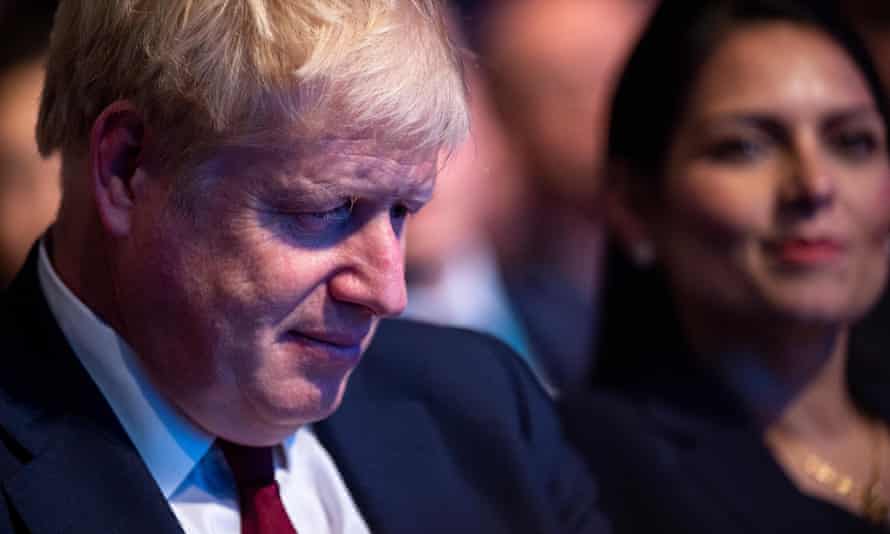Brexit and Covid have created the perfect moment for the politics of crackdown

We feel besieged and imperilled, and the Johnson government is seizing the chance to weaken our most fundamental liberties

If you were wondering when the widely predicted post-Brexit dystopia might move beyond the imaginings of TV scriptwriters and into the real world, we suddenly seem to be a lot of the way there. Supermarket shelves are either understocked or completely empty. The populist loudmouths who now try to make the political weather have been taking aim in the past week at the Royal National Lifeboat Institution and its supposedly “woke” lifesavers.
Meanwhile, the Johnson government’s descent into whip-crack law enforcement continues apace. Last week’s announcement of a new “crime reduction plan” was centred around the permanent relaxation of restrictions on “suspicionless” (in other words, often arbitrary) stop and search, which had a clear performative aspect: ministers blithely batting away the fact that black people are a staggering 18 times more likely to be searched than white people under these specific powers, presumably to demonstrate a wretched kind of toughness. Johnson also launched plans for chain gangs dressed in hi-vis jackets.
The proposals were grim but not that much of a surprise. It is, after all, an iron rule of British politics that when governments sense a slide in popularity and start to lose direction, these are the kind of announcements they reach for.
In 2008, the rudderless government led by Gordon Brown oversaw the introduction of high-visibility “community payback jackets“, and developed a fondness for endless promises to take action against “yobs”, while seeking to extend the state’s powers to detain people without trial.
Eight years earlier, Tony Blair had floated the harebrained idea of marching miscreants to cash machines and summarily fining them – before his authoritarian instincts roared into the foreground thanks to the so-called war on terror. In the Thatcher and Major years, the doctrinaire economic liberalism the former brought to Conservative thinking was always accompanied by a repressive iron fist that tended to land on people already experiencing prejudice and insecurity. It all embodied the very British dissonance of an establishment that rhapsodises about its love of freedom while habitually doing whatever it can to curtail it.
As with many of his predecessors, the crucial point about Johnson’s authoritarian manouevring is that it mixes cynical posturing with a coherent drive to weaken basic liberties. The police, crime, sentencing and courts bill is on its way through parliament, and seemingly on course to introduce biting new restrictions on the right to protest and on the freedoms of Gypsy and Traveller communities.
As if to underline the government’s frantic pace, the nationality and borders bill has just received its second parliamentary reading, and looks set to further victimise refugees, partly via the Kafkaesque idea of making arrival in the UK without permission a criminal offence. In late July, the government clarified moves that will limit judicial review of ministerial decisions; the Home Office is pushing for extensions to secrecy laws that would have a dire effect on investigative journalism; on and on the list goes. What is afoot is perhaps crystallised by the way that ministers’ apparently rising enthusiasm for vaccine passports dovetails with their proposals for voter ID, and threatens to create the kind of society where exercising even one’s most basic rights is contingent on other people’s diktats.
The timing of all these things is hardly accidental. Since March last year, we have lived with the draconian provisions of the Coronavirus Act, vastly increased police powers including huge on-the-spot fines for breaking regulations (black and minority ethnic people were found to be 54% more likely to receive fines than white people), and the repeated imposition of new restrictions with no parliamentary scrutiny.
Most liberal voices have been conspicuously quiet, seemingly clinging to the idea that Covid is such a dire threat to life that no response to it could ever be disproportionate, and that if the loudest voices against those state powers are Tory libertarians and conspiracy theorists, it is best to stand on the opposite side.
We now see that the government has seized its chance: it wants to sustain and expand the most authoritarian elements of its newly acquired powers, while measures that were more constructive and progressive – and which gave people the assistance they needed to live within Covid rules – bite the dust. The furlough is on its way out, along with the weekly GBP20 increase in universal credit. The government seems little interested in building on the kind of community spirit that got many of us through the most miserable phases of lockdown. But the most repressive aspects of the state are going to balloon.
If you want a vivid illustration of flailing authoritarianism and its acceptance, take a look at Australia. There, the government’s lamentable record on vaccination has fused with an emphasis on insanely harsh restrictions. In Sydney, for instance, it was confirmed last week that soldiers will be involved in imposing new lockdowns, as the country pursues the impossible goal of “zero Covid”.
The areas of Sydney that are now facing the most punitive measures are largely home to working-class and ethnic minority communities, and there have been loud complaints that the policy amounts to a huge act of racial profiling. Yet the reporting too often suggests that its opponents are exclusively rightwing libertarians. Many Australians, meanwhile, are quietly thinking about what life under such rules means for people who are already marginalised and insecure, along with how fragile the most precious aspects of free societies sometimes turn out to be.
The politics of crackdowns thrive when millions are encouraged to feel besieged and imperilled, a condition that looks set to endure. As well as the pandemic, the summer’s floods also suggest this could be our future. And there’s a huge political danger: the prospect of the climate crisis and the environmental damage that threatens more pandemics remaining unchecked, while governments endlessly crack down on the instability these things let loose and the communities who are most affected.
Who will oppose those in power? In the UK, belief in the sanctity of the rule of law and civil liberties runs across some of the Conservative right, parts of the Labour left and elements of the Lib Dems and Greens; but the supposed mainstream tends to either scoff at such ideas or meekly look the other way. As a result, many of us now have a familiar sensation: feeling scattered and lonely; and in such surreal, doom-laden times, wondering what on earth will happen next.
-
John Harris is a Guardian columnist